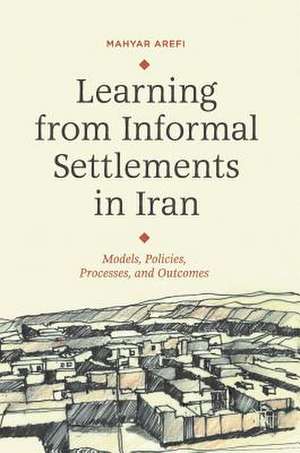Learning from Informal Settlements in Iran: Models, Policies, Processes, and Outcomes
Autor Mahyar Arefien Limba Engleză Hardback – 17 aug 2018
| Toate formatele și edițiile | Preț | Express |
|---|---|---|
| Paperback (1) | 413.83 lei 38-45 zile | |
| Springer International Publishing – 19 dec 2018 | 413.83 lei 38-45 zile | |
| Hardback (1) | 583.61 lei 6-8 săpt. | |
| Springer International Publishing – 17 aug 2018 | 583.61 lei 6-8 săpt. |
Preț: 583.61 lei
Preț vechi: 686.60 lei
-15% Nou
Puncte Express: 875
Preț estimativ în valută:
111.67€ • 116.59$ • 92.42£
111.67€ • 116.59$ • 92.42£
Carte tipărită la comandă
Livrare economică 04-18 aprilie
Preluare comenzi: 021 569.72.76
Specificații
ISBN-13: 9783319784076
ISBN-10: 3319784072
Pagini: 199
Ilustrații: XV, 199 p. 10 illus.
Dimensiuni: 148 x 210 mm
Greutate: 0.41 kg
Ediția:1st ed. 2018
Editura: Springer International Publishing
Colecția Palgrave Macmillan
Locul publicării:Cham, Switzerland
ISBN-10: 3319784072
Pagini: 199
Ilustrații: XV, 199 p. 10 illus.
Dimensiuni: 148 x 210 mm
Greutate: 0.41 kg
Ediția:1st ed. 2018
Editura: Springer International Publishing
Colecția Palgrave Macmillan
Locul publicării:Cham, Switzerland
Cuprins
1. Introduction.- 2. Revisiting the Informal Settlement Phenomenon.- 3. Informal Settlements and Urban Management in Iran.- 4. The World Bank's Slum Upgrading Programs in LDCS.- 5. Five Iranian Target Cities.- 6. Empowering Slums in Iran.- 7. Data Collection.- 8. From Goals to Outcomes.- 9. The Four Failures (Challenges).- 10. The Empowerment Paradox.
Notă biografică
Mahyar Arefi is Professor at the University of Texas at Arlington, USA. As a recipient of several awards and scholarships, he writes extensively on planning and urban design issues, and his latest book, Deconstructing Placemaking: Needs, Opportunities and Assets was published in 2014.
Textul de pe ultima copertă
This book explores the tenacity of Iran’s informal settlements against the backdrop of the World Bank’s USD 80 million loan for physical upgrading. Arefi seeks to identify and unravel the distinctive models, policies, processes, and outcomes associated with it, and explains why—despite obvious challenges—informal settlements remain popular in Iran, and also how understanding them in a broader theoretical context helps rectify existing redevelopment policies in order to develop more effective ones.
Caracteristici
Looks at informal settlements from a perspective outside of the oft-studied Latin America Offers a glimpse into the mechanisms underpinning the tenacity of Iran's informal settlements Explores the history of the World Bank's involvement in Iran's recent history
